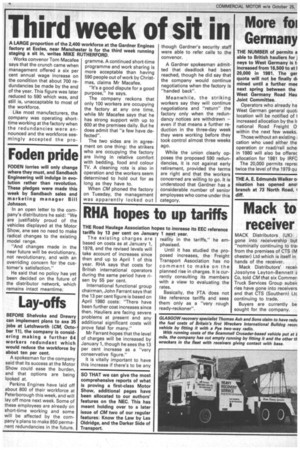Third week of sit in
Page 6

If you've noticed an error in this article please click here to report it so we can fix it.
A LARGE proportion of the 2,400 workforce at the Gardner Engines factory at Eccles, near Manchester is for the third week running staging a sit in, writes MIKE RUTHERFORD.
Works convenor Tom Macafee says that the crunch came when management offered a six per cent annual wage increase on the condition that about 700 redundancies be made by the end of the year. This figure was later reduced to 590 which was, and still is, unacceptable to most of the workforce.
Like most manufacturers, the company was operating shorttime working at the factory when the redundancies were announced and the workforce seemingly accepted the pro gramme. A continued short-time programme and work sharing is more acceptable than having 590 people out of work by Christmas, claims Mr Macafee.
"It's a good dispute for a good purpose," he says.
The company reckons that only 100 workers are occupying the factory at any one time, while Mr Macafee says that he has strong support with up to 600 at the premises daily. But he does admit that "a few have defected".
The two sides are in agreement on one thing: the strikers who are occupying the factory are living in relative comfort with bedding, food and colour TV. A cleaning rota is also in operation and the workers seem determined to hold out for as long as they have to.
When CM phoned the factory on Tuesday, the management was apparently locked out though Gardner's security staff were able to refer calls to the convenor.
A Gardner spokesman admitted that deadlock had been reached, though he did say that the company would continue negotiations when the factory is "handed back".
Meanwhile, the striking workers say they will continue negotiations and "return" the factory only when the redundancy notices are withdrawn — even if that means a further reduction in the three-day week they were working before they took control almost three weeks ago.
While the union clearly opposes the proposed 590 redundancies, it is not against early retirement, provided the terms are right and that the workers concerned are willing to go. It is understood that Gardner has a considerable number of senior employees who come under this category.
























































































































































